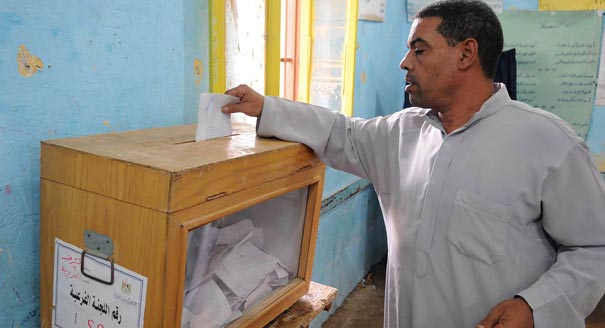As Egypt heads toward elections for the lower house of parliament on November 28 and the presidency in 2011, Cairo’s officials have got their story straight and they are sticking to it: this proud nation needs no international observation of its elections, which will proceed according to well-established laws and constitutional precepts. There is just one problem with this story, which is the history of past elections in the country: rigged and often violent. In fact, Egyptians’ sense of trust in formal politics (never great) has deteriorated to the extent that several opposition parties will boycott and those that will participate are suffering from internal rifts because many of their members do not want to legitimize the existing system.
Violence has also been a major factor in previous Egyptian elections and could be this time as well. The Ministry of Interior has in the past surrounded certain polling places—where a prominent pro-government candidate faced a strong opposition competitor— with security cordons, leading to violence as voters attempted to get in. Thugs working for the security services or hired by specific candidates have intimidated and physically (including sexually) assaulted voters, monitors, and journalists while police looked the other way. Will the orders be any different this year?
New measures specifically targeting Egypt’s largest opposition group, the Muslim Brotherhood, also raise doubts about how fair and competitive the elections will be. The Brotherhood, a banned organization, may run candidates only as independents but in 2005 they campaigned openly, using the slogan “Islam is the solution,” and contested almost one-third of the parliamentary seats. Now the Egyptian government has outlawed the slogan, police authorities are systematically rounding up supporters of the movement, and the electoral commission has denied registration to one-quarter of the Brotherhood’s proposed candidates.
The government meanwhile has registered all of the hopefuls of co-opted or weak secular opposition parties, while newer and more independent secular parties (such as the liberal Ghad and Democratic Front parties) are boycotting. This faces the ruling National Democratic Party (NDP) with a dilemma: it needs to win at least two-thirds of the parliament, but it also wants to create the image of real competition. With the Brotherhood on the run and more credible secular parties boycotting, a strong electoral showing by captive or weakened parties such as the Tagammu and the Wafd would be a sure sign of electoral meddling.
Media coverage is emerging as another major issue in light of recent measures by the government, like requiring satellite television channels to get official clearance before reporting live from anywhere in Egypt. The government also has stipulated that cell phone providers get a similar clearance before sending aggregate text messages to their users, a technique that has been increasingly used by the opposition to mobilize supporters and reach out to the public. And in spite of the diversity of the media landscape in Egypt, with its mix of public and private ownership, initial reports by Egyptian NGOs following media coverage and reporting in the lead-up to the elections have indicated a clear bias towards the ruling party and its candidates.





